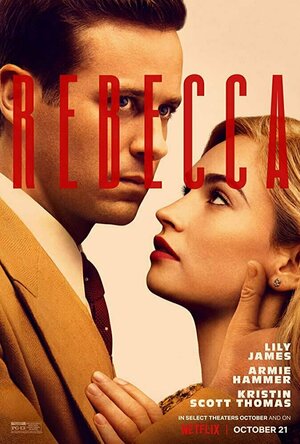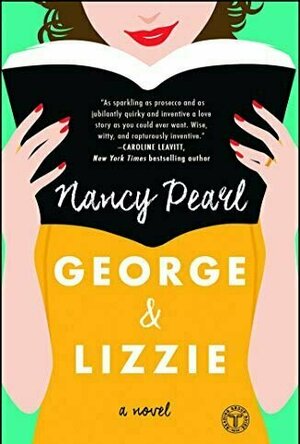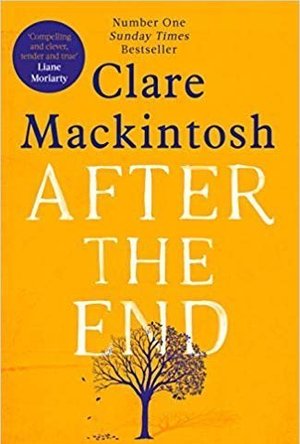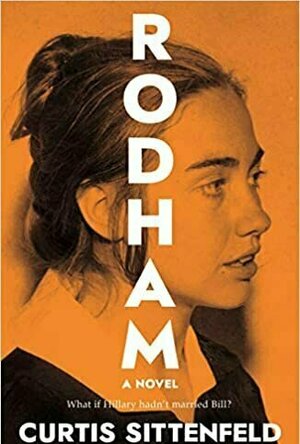
Enjoy Stress Relief
Health & Fitness and Magazines & Newspapers
App
Enjoy Stress Relief - Beat stress and live life ! For a limited time 50% Off The Price! Quit...
Whisperin' Bill Anderson: An Unprecedented Life in Country Music
Bill Anderson and Peter Cooper
Book
Whisperin' Bill: An Unprecedented Life in Country Music presents a revealing portrait of Bill...
Sarah (7800 KP) rated Rebecca (2020) in Movies
Nov 1, 2020
Rebecca as a novel is a classic and a book I very much enjoyed, and whilst I’ve never seen the Hitchcock adaptation, it’s often referred to as a fairly legendary classic too. However I’m afraid to say the same cannot be said about this new version. The basic plot and story is present, although rather frustratingly the ending has been extended unnecessarily, but it has not been executed very well.
The trailer made this look quite sinister and spooky, which is quite right when the original novel is a gothic horror with aspects of a ghost story thrown in. However this film turns out to be nothing of the sort. It’s more of a romantic drama with a hint of thriller thrown in – the gothic horror ghost story is nowhere to be seen and neither is any form of intrigue or suspense. In fact I’d be so bold as to say this is just outright dull, and even the campy over the top sinister vibes from Kristin Scott Thomas’s housekeeper Mrs Danvers are laughable at best. The most interesting part of this was the opening scene with it’s sinister score but this just didn’t carry through to the rest of the film.
Sadly the cast don’t fare very well in this either. Lily James is a great actor, but her version of the new wife is too mousy and timid and you wonder what on earth Maxim ever sees in her. The character herself is very frustrating and irksome as she’s far too naïve and sweet. And Armie Hammer is miscast as Maxim De Winter himself. He looks the part, dashing and handsome, but he’s lacking in the intrigue, charm and secrecy that you’d expect this character to have. He’s also missing the age gap that is rather notable in the book.
The cinematography in this is rather concerning. The scenes in Monte Carlo are far too colourful and garish and they just look out of place, even more so for something that is meant to be a gothic horror. I’m unsure of why this has been done, other than to show a striking difference between Monte Carlo and Maxim’s Cornish home of Manderley. In fact what is most concerning about this film is why Ben Wheatley wanted to direct it. By far the biggest shock of this film was finding out Wheatley, of Kill List and Sightseers fame, had directed it. Wheatley is known for psychological dark (and often funny) thrillers and there is nothing of his style to be seen in this film at all. Which is a shame, as I think a little more of his dark style would’ve propelled this film into more than just a sub-par drama.
Overall this a very disappointing and long winded adaptation of a classic novel. Whilst there are a few decent scenes and a good, if not out of character, performance from Lily James, these are nowhere near enough to save this from being a bit of a bore.
Kristy H (1252 KP) rated That Summer in Books
May 27, 2021
"For the last six months, Daisy had been receiving emails that she realized were intended not for her, but for the other Diana."
This is not a light and airy beach read, but a serious book that focuses in on the recent #MeToo topic. Much of the book doesn't even take place on the promised Cape setting. Does that mean it's not worth a read? Not at all. Weiner's constructed a compelling and heartfelt tale, with characters that pull you into the story. It feels a little reminiscent of some other #MeToo stories I've read recently, but I was still glued to the pages, wondering what had happened in Diana's past and how things would turn out for everyone.
There's a bit of a mystery here, but it's not too hard to figure out how everything pieces together. The real focus is the characters. We have Daisy, insecure and struggling in her marriage to Hal, a wealthy and arrogant man more than a decade older than her. It's clear Hal takes Daisy for granted--and that may be letting him off easy. Their daughter, Beatrice, was a favorite of mine: an original teen, with her own unique way of living her life. Beatrice's scenes stood out; she's a character I won't soon easily forget. We also have Daisy's brother, Danny, and his husband Jesse. And then there's the "other" Diana, who worms her way into Daisy's life. Can we trust her? Diana was a memorable character to me as well, along with someone close to her. (I don't want to say much more for spoilers.)
The book is told mainly from Daisy, Diana, and Beatrice's perspectives. It goes back and forth in time. It's a little confusing in the beginning, getting the timeline straight and how all the characters relate. Once I got that down, it was a fast read. Some of it may be a little predictable, but it's in turns sad, heartwarming, and funny. I loved Beatrice, as mentioned, and the dynamic between Daisy and Diana was well-written. Weiner does a good job of exploring how class and privilege relate to sexual assault (a definite trigger warning for rape in this story) and the repercussions of rape across individuals, families, and friends. She focuses, too, on the importance of accepting those you love for who they are, no strings attached.
Overall, I'm quite glad I picked this one up. Despite some of the vague familiarity to other #MeToo books, for the most part, it felt refreshing and interesting. It certainly held my attention and brought to light the important topic of rape and its aftermath. The characters here are well-drawn, and I'll always have a place in my heart for dear Beatrice. 4 stars.
Kristy H (1252 KP) rated George and Lizzie in Books
Oct 29, 2020
In high school, Lizzie made a choice--one she soon regrets--participating in something called the Great Game. The event alters the course of her life forever, along with a passionate relationship that ends in college. These moments, plus the influence of Lizzie's psychologist parents, who offer her little support as a kid, turn her into a melancholy and unfulfilled adult. Her husband, George, however, comes from a happy childhood with loving parents. He adores his family and they him. He also worships Lizzie, giving the two an unbalanced marriage. Can George and Lizzie survive an union on such unequal ground?
I'll confess that this book was not what I was expecting--I thought it was going to be a cheerful love story and a pick-me-up. It is a love story, though, all the same. George loves Lizzie. Lizzie, though, is lost in a love from the past. I'm not going to lie: Lizzie is a very frustrating character and a hard one for whom to care. She doesn't appreciate George, nor, really, much of her life. Now, she was truly saddled with terrible parents, so you have to grant her that. Her fixation on her past relationship makes you want to shake her, though.
"And because for years and years the voices in her head never let Lizzie forget that the Great Game had been a stupid idea right from the beginning and that she'd been an idiot for participating in it, her past was always there, a living thing. It shaped her present and future."
And of, of course, there is the Great Game--the event from high school which alters Lizzie's future. We can understand why Lizzie is Lizzie, but we can't always forgive her for her Lizzie type ways. Also, please note, there are a lot of football references in this book. A lot. I like football, but I'm not sure everyone who picks up a book like this will feel the same.
The story of George and Lizzie is told in very short vignettes (each with a title) that slowly move forward in time and alternate with Lizzie's past, mainly focusing on the Great Game, which so defined her life. This format takes much getting used to. There is no linear story here, but tiny bits and pieces of narrative from George and Lizzie. I almost abandoned the book when I first started--I couldn't get in the groove (and honestly, it's depressing). When I reluctantly returned to it a few days later, more prepared for the format, I could read it more easily.
In the end, I can't say I enjoyed this story. If I rated it purely on "like" factor, it would probably be a two-star read. Incorporating in Lizzie's life experiences and how a few things slowly grew on me, I'm giving this three stars, but only barely. (Also, I have real issues with how many kids from Lizzie's high school football team went on to the NFL. Maybe it's possible, but it seems insane.) 3 stars, but only eked out when they brought the chains out on the field to measure (too much?).
Kristy H (1252 KP) rated After the End in Books
Jun 25, 2019
Clare Mackintosh offers us a beautiful, poignant, and heartbreaking book based on her life experiences, having lost her own son. Knowing this makes the book even more tender and real, as each word is based on a kernel of truth. Reading this book isn't always easy--as a parent, my heart digested these words and put myself in the shoes of Max and Pip. This book makes you think, and it makes you so incredibly grateful for your own life, wanting to snuggle your own children and hold them dear.
"How can my son be a breath away from death, when evidence of his life is all around me? When I feel him in my heart, as surely as when I carried him in my womb?"
The story is one of loss, yes, but it's also a love story: Max and Pip, Dylan and his family, and more. We are introduced to Dylan's family and also to Dylan's doctor, Leila, whom I really liked. Leila has her own struggles. Her mom, Habibeh, is visiting, but won't leave the house, preferring to watch QVC and cook endlessly for her daughter. (Habibeh is a trip; she's awesome.) The decision of Dylan's fate falls on Leila's shoulders first: a lot for a young doctor to bear. We get the story through her eyes and then each of Dylan's parents. As a mom, I felt drawn to Pip, but I liked how we got both Pip and Max's perspectives. Each only wants what is best for their son--and, at first, each feels they are doing the right thing.
"However long you spend with someone, however well you think you know them, they can still be a stranger to you."
Mackintosh is best known for her thrillers, and, this book is just as well-written as those. And, interestingly enough, she throws in a bit of a twist here, too. I won't spoil it, per se, but will tell you that this book is a fascinating exploration of choices, allowing you to think about life and the various paths that everyone can take. It's a sad book, yes, but lovely too--a tribute to parents, medical professionals, and to the children we love so much. It's a reminder to cherish those we hold dear and that life can be short but beautiful, no matter which way it may turn out.
Overall, even though I found this difficult to read at times, I'm really glad I did. I was reminded, yet again, what a good writer Clare Mackintosh is. I'm so incredibly sorry she lost her son, and I'm in such awe that she could turn that loss into such a lovely book. I highly recommend this--it's a beautiful exploration of life's different paths and what fate can bring us.
Kara Skinner (332 KP) rated Claiming Her Highway in Books
Sep 10, 2019
Words: 17,970
Average Goodreads Rating: 3.8/5 stars
My rating: 2/5 stars
Cass runs one of the greatest band of highwaymen around. Despite being a woman, she’s respected by her crew, and every night they return to camp richer than they were and she can enjoy being in the arms of her second-in-command, Will Carpenter. But that all changes when Will accepts a position in the King’s Guard. Cass knows Will wants more than what she can give him. He wants marriage and kids, as well as honest work instead of thieving. But Cass doesn’t know if she can ever give him up.
Claiming Her Highwayman is free on Smashwords.
I found myself underwhelmed by this story. When it starts, Will and Cass are already a couple, and the chemistry between them already feels forced, as well as the heist they’re about to go on. It’s like a bad first draft that hasn’t developed into something greater yet. Cass and Will feel more like paper dolls than people and unfortunately, I never get that attached to them. They just don’t have the chemistry.
It doesn’t help that my suspension of disbelief took a huge beating when Will’s offered a job with the King’s Guard, as the princess’s personal guard. He’s a highwayman! Since when do they let criminals guard princesses? Um, never. Not only that, but he’s still in contact with his old gang, and he’s not even in training to be a soldier! He just is. Apparently the standards for becoming a member of the King’s Guard is really low.
It would make a hell of a lot more sense to me if there was a scarcity of guards for some reason, like the country was at war, and that’s why they’re turning to criminals to keep up with the demand of soldiers. That would flesh out the plot, too. But nope. Apparently we’re supposed to accept that a robber can become a princess’s bodyguard easily after mugging her with his gang of bandits. Oh, and he almost becomes her husband. Because every king wants his little girl to marry a common criminal.
Despite everything wrong with the story, I like Will’s and Cass’s characters. Even though Will only exists to be Cass’s lover, he’s got some pretty charming lines in the story. His need to protect her is incredibly sexy.
Cass’s character is a little more complex. She’s strong and independent, and she knows what she wants in life. She’s the type of girl who would be bored to death in most respectable professions for a woman, instead enjoying being a bandit. But I hated her when Bryce, one of her men, attacked her in her tent. All she did to defend herself was bide her time until she could scream for help
What. The. Fuck.
She’s a damn gang leader and she doesn’t know how to defend herself against one man who gets too handsy? Please. That’s fucking ludicrous, and all of my respect for her is just gone because of that one scene. How the hell did she become a leader in the first place if she needs to scream like a damn damsel whenever she gets attacked? Not cool.
This book really didn’t do much for me. While it’s all right, it’s not that good. The characters aren’t good, and neither is the writing. I suggest you look elsewhere for your historical romance bad boy.

ReGain - Counseling
Health & Fitness and Lifestyle
App
*** WHAT IS Regain? *** Regain will provide you and your partner access to a licensed, trained...

MobileFamilyTree 8
Productivity and Reference
App
Immerse yourself in the world of mobile genealogy and experience the first and only full-featured...
"The first time I saw him, I thought he looked like a lion."
But here, in this imaginative and powerful novel, Hillary does not accept Bill's third proposal. Devastated, she leaves Arkansas and embarks on a different life. The pair's paths cross again (and again) in the years ahead, causing Hillary to sometimes doubt her decision.
I found this to be such an interesting read and oddly hopeful somehow, as if Sittenfeld read my brain and created the world I dreamed of--what a great book to read during these dismal times. It takes a little time to get into the flow of the writing: the first-person narrative certainly places you in the action, but I needed to adjust to switching back and forth between time periods (Hillary's past and present). And, funnily enough, you have to remember that this is and isn't Hillary--the first quarter of the book or so loosely follows Hillary's real life, so sometimes you have to recall who is truly speaking. I am not actually reading a Hillary memoir.
I loved how this book rewrites history--and with zero apologies. Bill Clinton does not always come off looking good here, though the love and chemistry between the two is clearly palpable. You find a variety of other characters from real life, so to speak, who sometimes play their actual roles, or re-imagined versions, and it's so fun. And, why yes, even Donald Trump has a place here. What a wonderful place it is, too. If you love politics, or political satire, there's a lot to love here.
"'If Bill Clinton was my boyfriend, I'd keep an eye on him too.'"
The Hillary of Sittenfeld's world is so real, so true, and so vulnerable and lovable. (And whoa, are there sex scenes, guys.) Even better, Sittenfeld doesn't make her perfect by any stretch; she's flawed and fallible, too. It doesn't take long to see history's actual Hillary taking this path, and sometimes, oh sometimes, I longed for her to do so. Sittenfeld excels at telling a tale from another person's perspective, somehow putting herself in their shoes. I got so caught up in this Hillary's world that I read the last half of the book in one take, desperate to know what happened to her. She felt real to me, and I needed to know how her life turned out. Please, Hillary, let it all work out this time.
This book is different, yes. It might not be for everyone, politically. But I found it fascinating to think about such a thing--how the choices we make in life affect so much. Not just saying yes to a marriage proposal, but all the other actions we take on any given day. This is a smartly written book, cementing Sittenfeld as a brilliant writer and storyteller. 4 stars.






